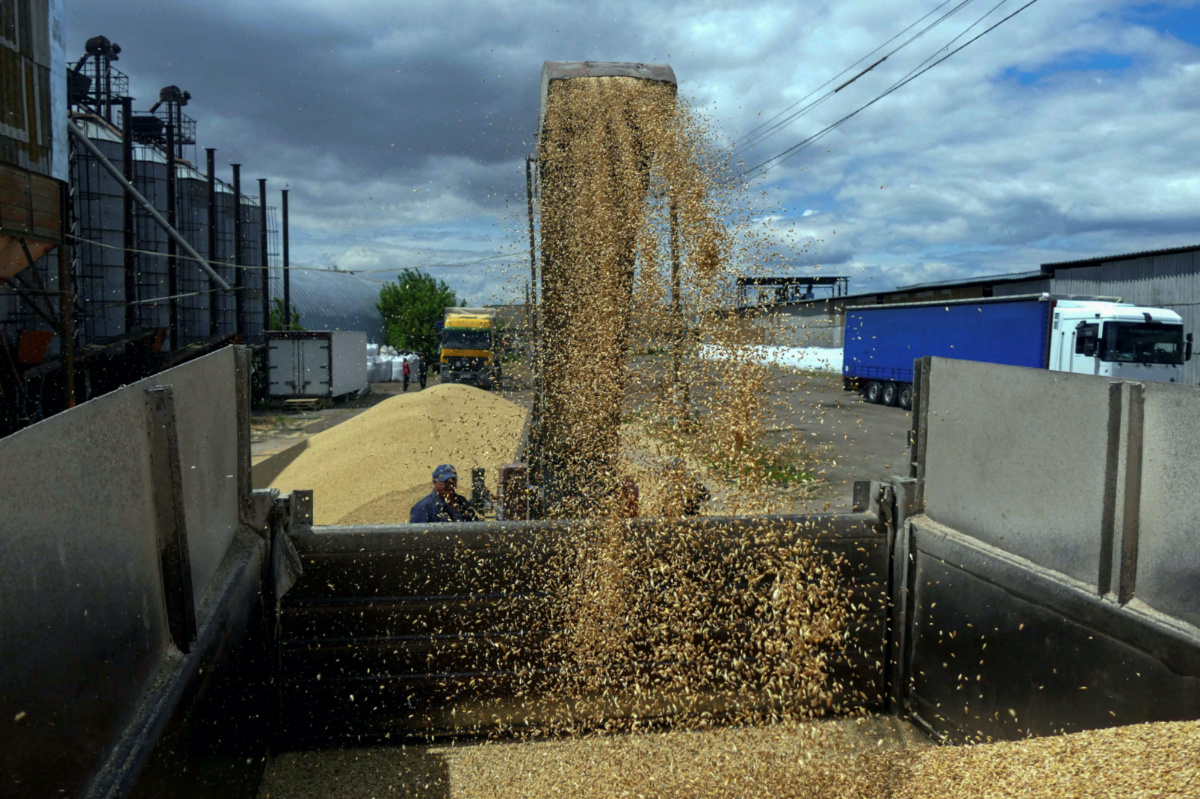Warsaw, Poland
Reuters
Unilateral action on trade by European Union member states is unacceptable, the bloc’s executive said on Sunday, after Poland and Hungary announced bans on grain and other food imports from Ukraine to protect their local agricultural sectors.
After Russia’s invasion blocked some Black Sea ports, large quantities of Ukrainian grain, which is cheaper than that produced in the European Union, ended up staying in Central European states due to logistical bottlenecks, hitting prices and sales for local farmers.

A worker loads a truck with grain at a terminal during barley harvesting in Odesa region, Ukraine, on 23rd June, 2022. PICTURE: Reuters/Igor Tkachenko
The issue has created a political problem for Poland’s ruling nationalist Law and Justice (PiS) party in an election year as it has angered people in rural areas where support for PiS is usually high.
“We are aware of Poland and Hungary’s announcements regarding the ban on imports of grain and other agricultural products from Ukraine,” a spokesperson for the European Commission said in an emailed statement.
RUSSIA SAYS WAGNER FIGHTERS TAKE TWO MORE BLOCKS IN BATTERED BAKHMUT
Russia said on Sunday that Wagner mercenary units supported by airborne troops had captured two more city blocks in the eastern Ukrainian city of Bakhmut, target of a major offensive by Moscow.
Wagner has spearheaded Russia’s attempt to take Bakhmut since last summer in what has been the longest and deadliest battle of the war for both sides.
Russia’s defence ministry said Wagner assault squads had taken two blocks in the northwestern and southeastern parts of Bakhmut, which has largely been destroyed in the fighting.
Russian army paratroop units were supporting Wagner by holding back Ukrainian forces on the flanks, it added.
Reuters could not independently verify Russia’s claim, which Kyiv did not directly address.
Serhiy Cherevatyi, spokesperson for Ukraine’s eastern military command, said Wagner troops were acting as a battering ram and attacking dozens of times a day.
“The enemy continued to attack our positions with Satanic zeal,” he told the Ukrainian parliament’s television channel.
Britain said in an intelligence update on Friday that Ukrainian troops had been forced to withdraw from some territory in the city in the face of a renewed Russian assault.
– Reuters
“In this context, it is important to underline that trade policy is of EU exclusive competence and, therefore, unilateral actions are not acceptable.”
“In such challenging times, it is crucial to coordinate and align all decisions within the EU,” the statement added.
Polish government spokesman Piotr Muller told state-run news agency PAP the government was in constant contact with the European Commission about the issue, and that the ban was possible due to a security clause.
Poland and Hungary have been embroiled in long-running conflicts with Brussels over issues including judicial independence, media freedoms and LGBT rights, and both have had funds withheld due to concerns over the rule of law.
Ukraine’s farm minister Mykola Solsky talked to Hungarian counterpart Istvan Nagy on Sunday and underlined that unilateral decisions were unacceptable, the Ukrainian farm ministry said in a statement. The two agreed to talk again soon, it said.
The ministry said on Saturday that the Polish ban contradicted existing bilateral agreements on exports, and called for talks to settle the issue.
Meanwhile, Bulgaria’s Agriculture Minister Yavor Gechev said the country was also considering a ban on Ukrainian grain imports, local agency BTA reported on Sunday.
Transit
The Polish ban, which came into effect on Saturday evening, will also apply to the transit of these products through the country, the development and technology minister said on Sunday.
“The ban is full, including the ban on transit through Poland,” Waldemar Buda wrote on Twitter, adding that talks would be held with Ukraine to create a system that ensures goods only pass through Poland and do not end up on the local market.
State-run Ukrinform news agency said Ukrainian and Polish ministers are due to meet on Monday in Poland and the transit arrangement would be the focus of the talks.
Poland’s Agriculture Minister Robert Telus was quoted as saying on Sunday that the ban was necessary to “open the eyes of the EU to the fact that further decisions are needed that will allow products from Ukraine to go deep into Europe, and not stay in Poland.”
The ban is due to last until June 30, the finance ministry said.
We rely on our readers to fund Sight's work - become a financial supporter today!
For more information, head to our Subscriber's page.
Ukraine normally exports most of its agricultural goods, especially grain, via its Black Sea ports, unblocked in July in line with an agreement between Ukraine, Turkey, Russia and the United Nations.
That accord is scheduled to expire on May 18 and Moscow indicated last week that it may not be extended unless the West removes obstacles to the export of Russian grain and fertiliser.
Around three million tonnes of grain left Ukraine every month via the Black Sea grain corridor while only up to 200,000 tonnes are moving to European ports through Polish territory, according to the Ukrainian ministry.
Solsky said at the weekend that 500,000 to 700,000 tonnes of various agricultural products cross the Polish border every month, including grain, vegetable oil, sugar, eggs, meat and other products.






